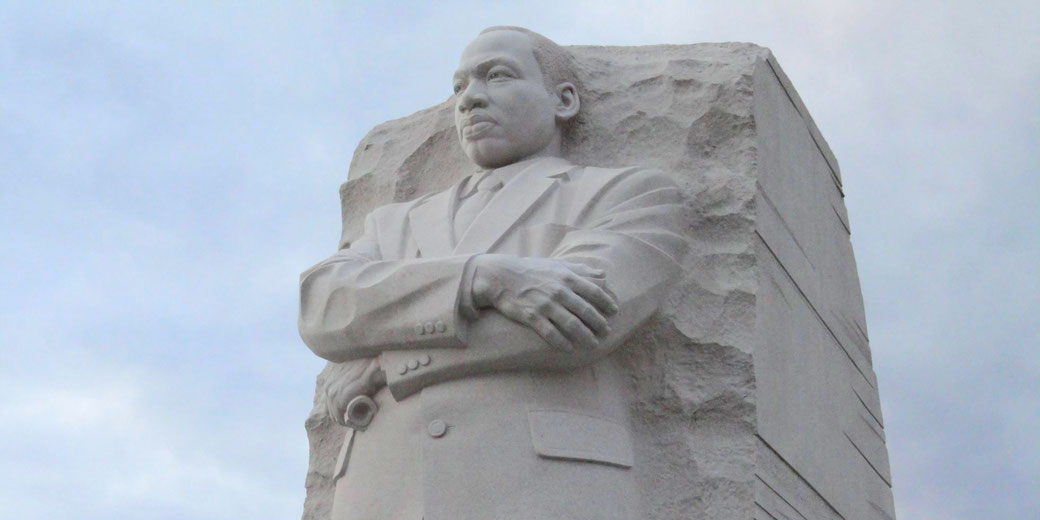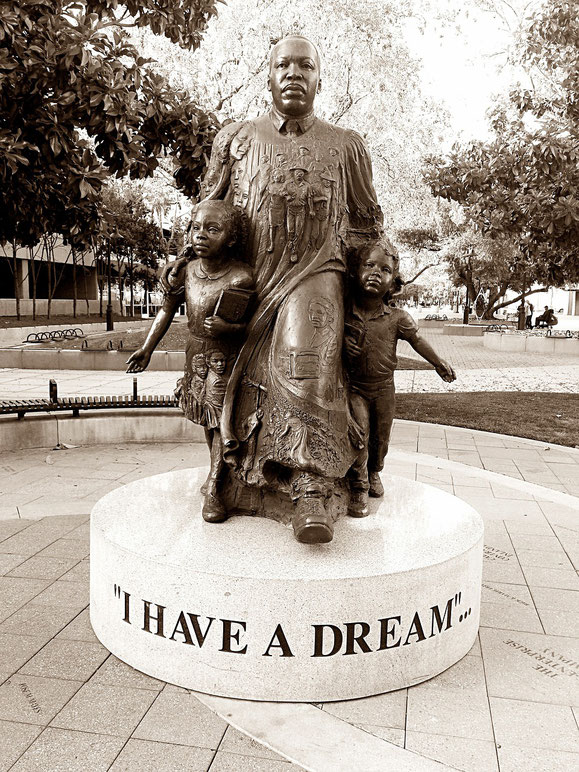From Montgomery to Memphis: The life and legacy of Martin Luther King Jr

Martin Luther King Jr is one of the most famous men in modern American history. He was a charismatic Baptist minister who became the moral compass of a nation in turmoil.
King would lead a social movement that forever changed America. But what made King’s movement so powerful was his unwavering belief that nonviolence could dismantle centuries of cruelty.
As a result, King’s struggle became the nation's struggle, forcing every American to ask: What kind of country would they build from the ashes of segregation?
What was Martin Luther King's childhood like?
Martin Luther King Junior was born with the name Michael King Junior on January 15th, 1929, in Atlanta, Georgia.
He was name after his father, Michael King Senior, and was the middle child of three that Michael Senior had with his wife, Alberta.
His father was a Baptist minister while his mother was a schoolteacher. As a young boy, King Jr. would often listen to his father's sermons at Ebenezer Baptist Church. It was here that he developed a love for public speaking.
After visiting Germany in 1934 and seeing the historical sites of the Protestant Reformation, King Senior returned to America and officially changed his name from Michael to Martin Luther, to honour the famous 16th century protestant reformer.
As a result, Michael Jr. also changed his name to Martin Luther.
At 15 years old, Martin Luther King Jr. enrolled at Morehouse College. He graduated from there in 1948 with a Bachelor of Arts degree in sociology.
Afterward, he attended Crozer Theological Seminary in Chester, Pennsylvania, from 1948 to 1951.
During his time there, he was elected student body president and graduated with a Bachelor of Divinity degree, finishing at the top of his class.
Then, in 1951, he began his doctoral studies at Boston University's School of Theology, where he pursued a Ph.D. in Philosophy, which he received in 1955.
This is where he met his future wife, Coretta Scott, in 1952. She was enrolled at the New England Conservatory of Music at the time.
King married Coretta Scott on June 18th, 1953, and they went on to have four children together: Yolanda, Martin Luther III, Dexter, and Bernice.
Following their wedding, King and Coretta moved to Montgomery, Alabama. It was here that King became the pastor of Dexter Avenue Baptist Church.
The Montgomery Bus Boycott
In the 1950s and 1960s, America was a country at war with itself. The clash between the ideals of freedom and the brutal reality of segregation tore at the seams of society.
In December of 1955, Rosa Parks was arrested for refusing to give up her bus seat to a white person.
This act of defiance inspired others in the black community to refuse to ride the buses.
The boycott lasted for 381 days and approximately 90% of African Americans in Montgomery participated, walking or carpooling instead of using public buses.
This placed a huge financial strain on the city bus system.
King was chosen as the leader of the boycott due to his gift for public speaking.
Unfortunately, during the boycott, King's house was bombed, and he was arrested.
In the face of these challenges, he continued to lead protests and rallies.
Regardless, on December 21st, 1956, the Supreme Court ruled that segregated seating on buses was unconstitutional, and the boycott came to an end.
Influences on King
At the time, Martin Luther King Jr. was greatly influenced by the work of Mahatma Gandhi.
Gandhi was an Indian political leader who fought for India's independence from British rule.
He did this through a process of nonviolent resistance. This is when people protest without using violence.
King was fascinated by this idea and started to use it in his own civil rights work.
After the success of the Montgomery boycott, in 1957, King became the president of the Southern Christian Leadership Conference (SCLC).
The SCLC was a civil rights organization that used nonviolent methods to fight for equal rights for all Americans regardless of race.
The Birmingham Campaign
In 1963, King and the SCLC came to Birmingham, Alabama, to protest against racism.
The city was one of the most segregated in America, and black people were treated very unfairly.
The police responded to the protests with force, using water hoses and dogs on the demonstrators.
This violent response was captured by news cameras and caused outrage around the world.
Undeterred by the escalating violence, King continued to lead more protests in Birmingham.
On April 12th, he was arrested for breaking an injunction that prevented demonstrations in the city.
While in jail, he wrote his famous 'Letter from a Birmingham Jail'. In it, he explained why it was important to use nonviolent methods when protesting against injustice.
Martin Luther King Jr.'s most famous speech
On August 28th, 1963, King gave his famous "I Have a Dream" speech at the Lincoln Memorial in Washington D.C.
It was delivered during the March on Washington for Jobs and Freedom, a massive civil rights demonstration attended by over 250,000 people, calling for an end to racial discrimination and for economic equality.
It has become one of the most well-known speeches in American history. In it, King talked about his dream of a future where all Americans are treated equally regardless of the color of their skin.
He also talked about how he wanted his children to be judged by their character and not by the colour of their skin.
This speech helped to inspire millions of Americans to fight for equal rights for all citizens, regardless of race.
It also helped to make Martin Luther King Jr. into a household name.
What awards did Martin Luther King Jr. receive?
In 1963, King was awarded the Time Magazine 'Person of the Year' award. This is given to the person who has had the biggest impact on the world in that year.
Time named him Person of the Year for his leadership in the civil rights movement, particularly related to the Birmingham campaign.
In fact, King’s activism was instrumental in the passage of the Civil Rights Act of 1964, which outlawed segregation in public places and banned employment discrimination based on race, color, religion, sex, or national origin.
Then, in 1964, at the age of 35, he became the youngest person to ever receive the Nobel Peace Prize.
He was given this award for his work in fighting for civil rights through nonviolent methods.
When King accepted the Nobel Peace Prize on December 10, 1964, in Oslo, Norway, he delivered a moving speech about the power of nonviolence and the urgency of the civil rights struggle, dedicating the award to the movement's goals of equality and justice.
Selma to Montgomery march
In 1965, King and the SCLC also helped to organize a march from Selma to Montgomery, Alabama.
This was to protest against the fact that black people were not being allowed to vote.
As the peaceful civil rights marchers attempted to cross the Edmund Pettus Bridge in Selma, Alabama, the police responded with force.
In an event that became known as 'Bloody Sunday' (March 7, 1965), state troopers violently attacked peaceful marchers.
This event led to the televised images of brutality that created a public outcry that led to President Lyndon B. Johnson proposing and Congress passing the Voting Rights Act of 1965.
This act made it illegal for states to stop anyone from voting based on their race.
This was another huge victory for King and the civil rights movement.
Martin Luther King Jr.'s later campaigns
By 1966, King still saw many cases of inequalities across America and actively sought out new initiatives for his nonviolent strategies.
So, in the same year, King and the SCLC shifted their focus to the North, leading a campaign in Chicago to address housing discrimination, slum conditions, and economic inequality.
They wanted to highlight the pervasiveness of racial injustice outside the American South.
Then, in 1967, King publicly condemned the U.S. involvement in the Vietnam War, when he delivered a powerful speech titled 'Beyond Vietnam' at Riverside Church in New York City.
He argued that the war was an unjust diversion of resources from addressing poverty and racial injustice at home.
In 1968, King also launched the Poor People's Campaign: an effort to address economic injustice and demand federal policies to alleviate poverty, which broadened the civil rights movement's focus to include economic equality for all races.
The assassination of Martin Luther King Jr.
In April of 1968, King had travelled to Memphis, Tennesse, to support the Memphis sanitation workers strike, which began in February 1968 after two Black sanitation workers were crushed to death by malfunctioning equipment.
On April 3rd, the night before his assassination, King delivered his final speech, 'I’ve Been to the Mountaintop,' in Memphis, Tennessee, where he spoke prophetically about the struggles of the movement and his own mortality.
Then, on April 4th, 1968, King was assassinated by James Earl Ray while standing on the balcony of his hotel room in Memphis.
James Earl Ray was a white man who disagreed with King's views on racial equality.
King's assassination led to riots and protests in over 100 American cities. It also resulted in the passage of the Civil Rights Act of 1968, which made it illegal to discriminate against people based on their race, color, religion, or national origin in housing and employment.
What is Martin Luther King still important?
In 1983, President Ronald Reagan signed a bill making Martin Luther King Jr. Day a national holiday.
This is celebrated on the third Monday in January, which is around the time of King's birthday.
Every year on this day, people across America celebrate King's life and legacy.
The creation of this holiday was meant to show how Martin Luther King Jr. had become one of the most important figures in American history.
He fought for civil rights through nonviolent methods in a way that helped to make America a more equal place for all citizens.
As a result, he will be remembered as an inspirational leader who changed the entire course of American history.
What do you need help with?
Download ready-to-use digital learning resources
Copyright © History Skills 2014-2025.
Contact via email
With the exception of links to external sites, some historical sources and extracts from specific publications, all content on this website is copyrighted by History Skills. This content may not be copied, republished or redistributed without written permission from the website creator. Please use the Contact page to obtain relevant permission.






